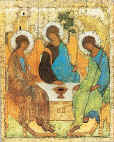I ended my last post with the phrase, “We [Christians] have so much more to offer [to political discourses]…” In reflecting upon my own words, and my own convictions, it occurs to me that it is all too easy as a blogger to point out the things that one finds problematic. But in my understanding of human behavior and ethical formation, I believe that the most enduring and truthful motivation for human action is to seek that which is good and true and beautiful – those ideals of the Western philosophical and theological tradition such as Truth, Justice, Goodness, and Love. In other words, the most powerful motivator and sources of inspiration are positive – they point us toward something that we can all relate to as intimately human and good. In one of my most cherished Scripture passages, Paul puts it this way:
“Finally, beloved, whatever is true, whatever is honorable, whatever is just, whatever is pure, whatever is pleasing, whatever is commendable, if there is any excellence and if there is anything worthy of praise, think about these things” (Phil 4:8).
Taking my own advice, then, I have been thinking about what examples I might find and highlight that demonstrate more precisely what it is I believe Christians have to contribute by way of positive vision to public debates about what is fitting, true, good, and just.
I didn’t need to go far from home to find something. Two institutions with which I am affiliated provide good examples. The University of St. Thomas, where I have just begun my career, is in the process of instituting a civil discourse component to its core curriculum, instigating efforts to fund an Endowed Chair in Civil Discourse, and creating a lecture series dedicated to public discussions about civil discourse. Moreover, St. John’s University in Collegeville, MN, my alma mater, recently created the Eugene J. McCarthy Center for Public Policy and Civic Engagement, in honor of the late Senator McCarthy (d. 2005 – not to be confused with Joseph McCarthy, the Senator from Wisconsin known for his anti-communism crusade), an alumnus of St. John’s University and former novice of St. John’s Abbey. Both of these institutions, inspired by Catholic and Benedictine ideals of the common good and civic engagement, have dedicated resources to bridging the bitter political and ideological divides that have become commonplace of American public life.
In holding up these kinds of ideals of that which is honorable, just, pure, praiseworthy, pleasing, commendable, or excellent, I hope to continue to keep my eyes peeled for these examples of the best of what Christians have to offer to civic discourse as an alternative to what Christian ethicist Eric Gregory has called the “exhausted politics of pessimism, skepticism, and nostalgia.” Such positive and inspiring ideals are needed in order to sustain a Christian form of civic virtue that can remain true to the Gospel call to love, while also speaking healing words into our political discourse.




